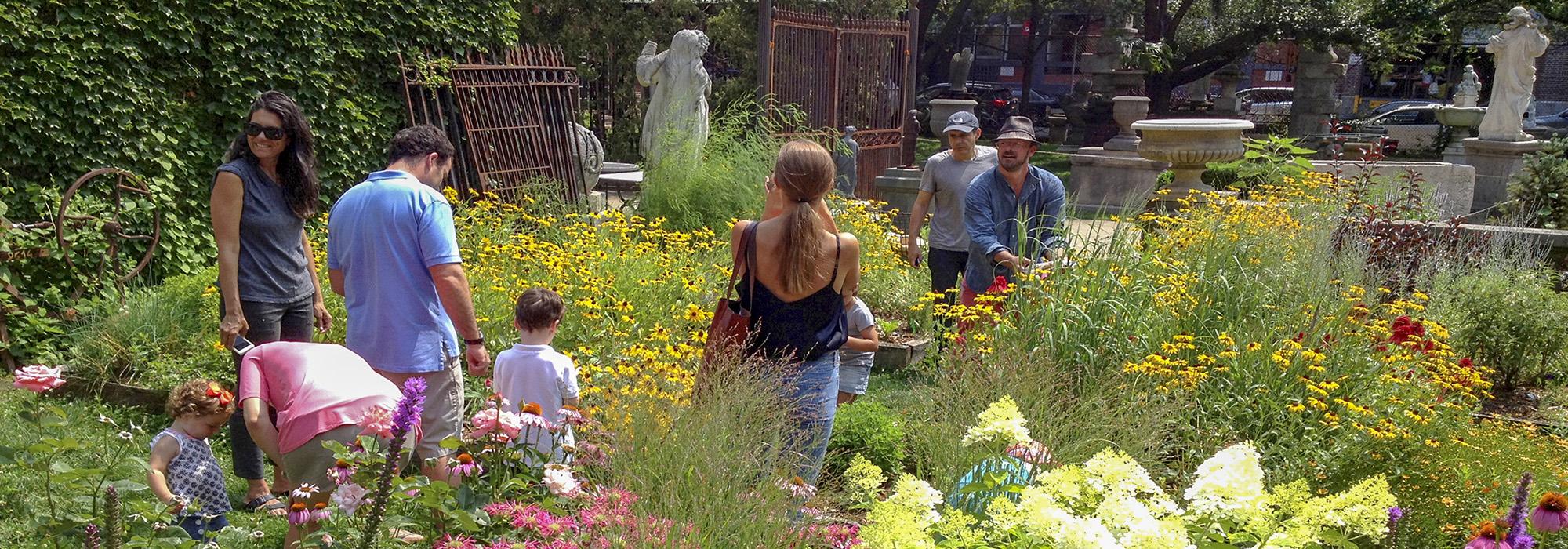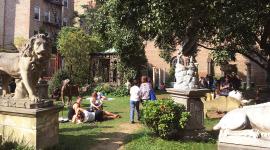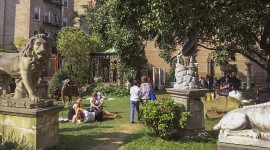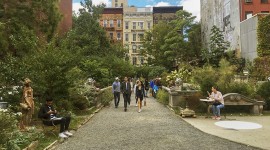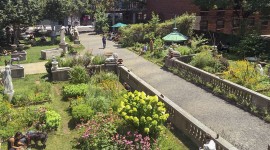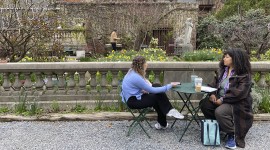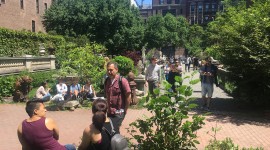The Elizabeth Street Garden Gets its Day in Court
The question of whether the Elizabeth Street Garden will remain or be demolished and turned into a mixed-use development called Haven Green is now in the hands of Manhattan Supreme Court Judge Debra James. Echoing the work of Elizabeth ‘Liz’ Christy and the Green Guerrillas from the 1970s, the garden was conceived in the dual traditions of community activism and outsider art. Local gallery owner Allan Reiver leased the vacant plot from the City of New York in 1991 and transformed it into the cherished green space. Christy’s work in transforming abandoned sites into vegetable gardens sparked a nationwide urban community-garden movement, and her first work was honored in 2013 with a listing in the National Register of Historic Places as part of the Bowery Historic District. The Cultural Landscape Foundation (TCLF), which enrolled the Elizabeth Street Garden in its Landslide program in November 2018, believes the Elizabeth Street Garden should likewise be evaluated as a contributing feature of the Little Italy Historic District, as the work of an outsider artist.
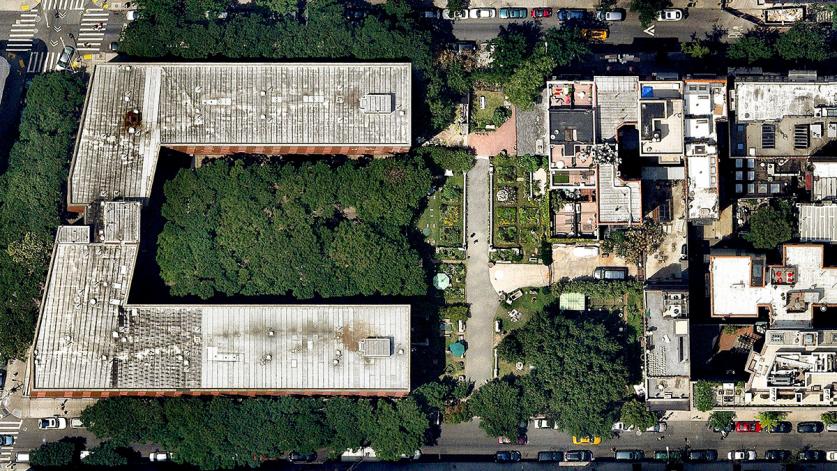
Proponents of Haven Green say the project would result in 123 units of affordable housing for low-income seniors and ground-level retail space. Advocates for the Elizabeth Street Garden, which has served the community since 2013, point to statistics that show residents in their neighborhood in lower Manhattan lack open space. Moreover, garden supporters say plans for the Haven Green project have created a false choice—one that needlessly casts supporters of open space and affordable housing in opposing roles. They argue that a vacant, city-owned lot at 388 Hudson Street offers the potential to build a much greater number of affordable-housing units.
In March 2019, the Elizabeth Street Garden filed a lawsuit against the City of New York and its Department of Housing Preservation and Development. Another suit aimed at stopping the development was filed separately by the non-profit Friends of Elizabeth Street Garden. The suits concern zoning laws and also argue that the city should complete an Environmental Impact Statement (EIS). The nearly three-hour hearing on Friday, December 4, 2020, featured the legal teams that have brought the two suits to prevent the garden’s demolition along with those for the city and the developers.
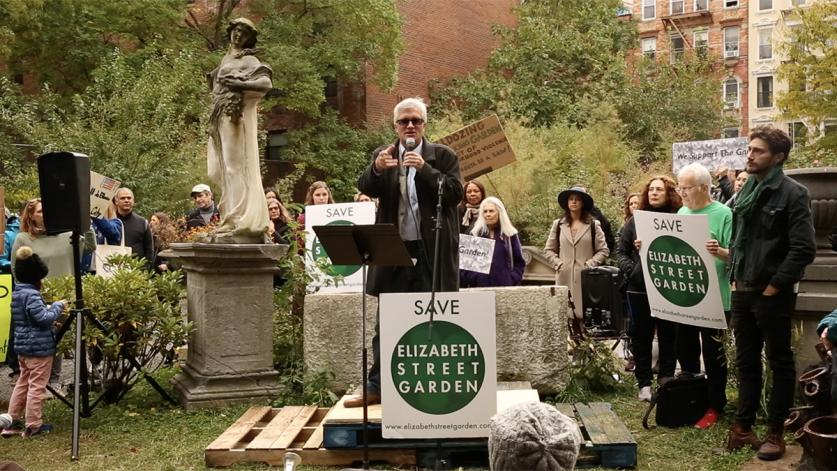
The garden sits within a 1.4-square-mile section of the city represented by Community Board 2 (CB 2), which voted unanimously against Haven Green on January 24, 2019. However, six months later on June 26, the City Council of New York City approved the Haven Green project. It’s important to note that the crammed neighborhoods of Little Italy and SoHo, which comprise 23 percent of CB 2's population, have only three percent of the district's open space—an open-space ratio of 0.07 acres per 1,000 residents (three square feet per resident), which equates to the size of a subway seat. Aside from the garden, other open-air public spaces in the neighborhood are paved.
With gazebos wreathed in wrought-iron flowers, paper lanterns strung up in pear trees, cement lions perched alongside clusters of overgrown rosebushes and beds of black-eyed Susans, the garden today is an oasis in the West Village—a unique combination of whimsical statuary and lush greenery. The collection includes a pair of marble columns and an iron gazebo designed by Olmsted Brothers for Burrwood (the former home of Walter Jennings) and a stone-and-granite balustrade designed by French landscape architect Jacques-Henri-Auguste Gréber. The balustrade was removed from the 36-acre Lynnewood Hall, considered to be one of the largest Gilded Age mansions in the Philadelphia area. Reiver has gifted both the gazebo and the balustrade to the garden in perpetuity.
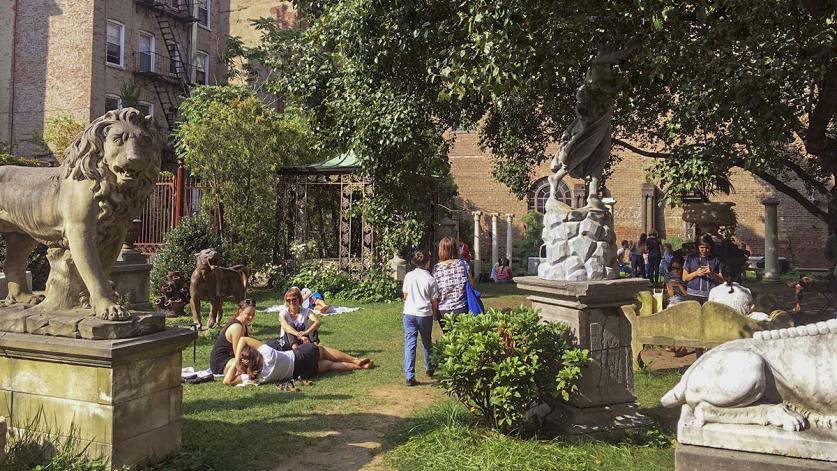
In a recent radio interview, the Elizabeth Street Garden executive director Joseph Reiver (Allan’s son) described the garden as an outdoor museum with free programs including yoga and tai chi, movie screenings, live music, and a place for outdoor recreation and gatherings. There is also educational programming for students at local public schools. The garden, Reiver says, fosters a sense of community in an otherwise hyper-gentrified area.
Following the December hearing, local news source Bedford and Bowery reported Elizabeth Street Garden attorney Norman Seigel saying: “We’re keeping our fingers crossed and hoping for the best.” Joseph Reiver, cited in the article as having confidence in the case, said: “If a truthful, transparent Environmental Impact Statement was done, it would show how vital the garden is and how much of a negative impact it would be to destroy it.” A decision is expected early in the new year.



